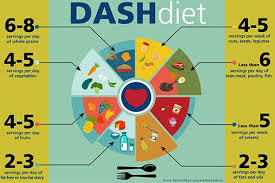Have you ever heard the saying you are what you eat? It is true our diet is a very important part of our heart health along with our general health. What we consume affects our body in many different ways, and we need to choose our foods wisely. Changing your diet can be hard but it can be done. A healthy diet is one of the best ways to fight cardiovascular disease. You need to start by knowing how many calories you should be eating and drinking to maintain your weight. Nutrition and calorie information on food labels is typically based on a 2000 calorie diet. You may need fewer or more calories depending on several factors including age, gender, and level of activity (AHA, 2017). You need to control your portion sizes, overloading your plate, taking seconds and eating until your stuffed can lead to eating more calories than you need. One way to do this is to use a small plate or bowl to control the amount you eat. Keep track of the servings you eat. Serving sizes are different depending on the food. A serving size is a specific amount of food, defined by common measurements such as cups, ounces, or pieces. You may need to use measuring cups and or spoons or a scale to keep track of serving sizes (Mayo Clinic, 2018).
It
can be hard to know what a healthy diet is with all the new diet trends out there.
As you make your choices here are a few recommendations:
·
Eat more fruits and vegetables- they are a
good source of vitamins and minerals, low in calories, and rich in dietary
fiber
·
Select whole grains- they are a good source
of fiber and other nutrients that can help regulate blood pressure and heart
health
·
Limit unhealthy fats- decreasing how much
saturated fats and trans fats you eat is important to decrease your risk of
coronary artery disease
·
Choose poultry and fish without skin-
prepare them without using saturated and trans fats
·
Select fat free and low-fat dairy products
·
Avoid beverages and food with added sugar
·
Choose food with less sodium and prepare
foods with little or no salt. Eat no more than 2400 milligrams of sodium per day
·
Limit your alcohol intake
With all the diets out there,
you need to make sure you choose one that meets the requirements. The American
Heart Association recommends the DASH eating plan, dash stands for dietary
approaches to stop hypertension. The DASH diet focuses on eating fruits, vegetables, grains and lean
meats. It recommends 2300mg of sodium per day. It has a lower salt version that
recommends no more than 1500mg of sodium per day. The DASH diet restricts red
meat, salt, added sugars and fat. It has been known to lower blood pressure in
people who have high blood pressure and in people who don’t.
Another diet also recommended is the Mediterranean diet.
Another diet also recommended is the Mediterranean diet.
American
Heart Association (2017, May 27). Diet and Lifestyle Recommendations. Retrieved
from, http://www.heart.org/HEARTORG/HealthyLiving/HealthyEating/Nutrition/The-American-Heart-Associations-Diet-and-Lifestyle-Recommendations_UCM_305855_Article.jsp#.WptprqinHIU
Mayo Clinic (2018, February 13). Heart-Healthy
diet: 8 steps to prevent heart disease. Retrieved from, https://www.mayoclinic.org/diseases-conditions/heart-disease/in-depth/heart-healthy-diet/art-20047702







No comments:
Post a Comment